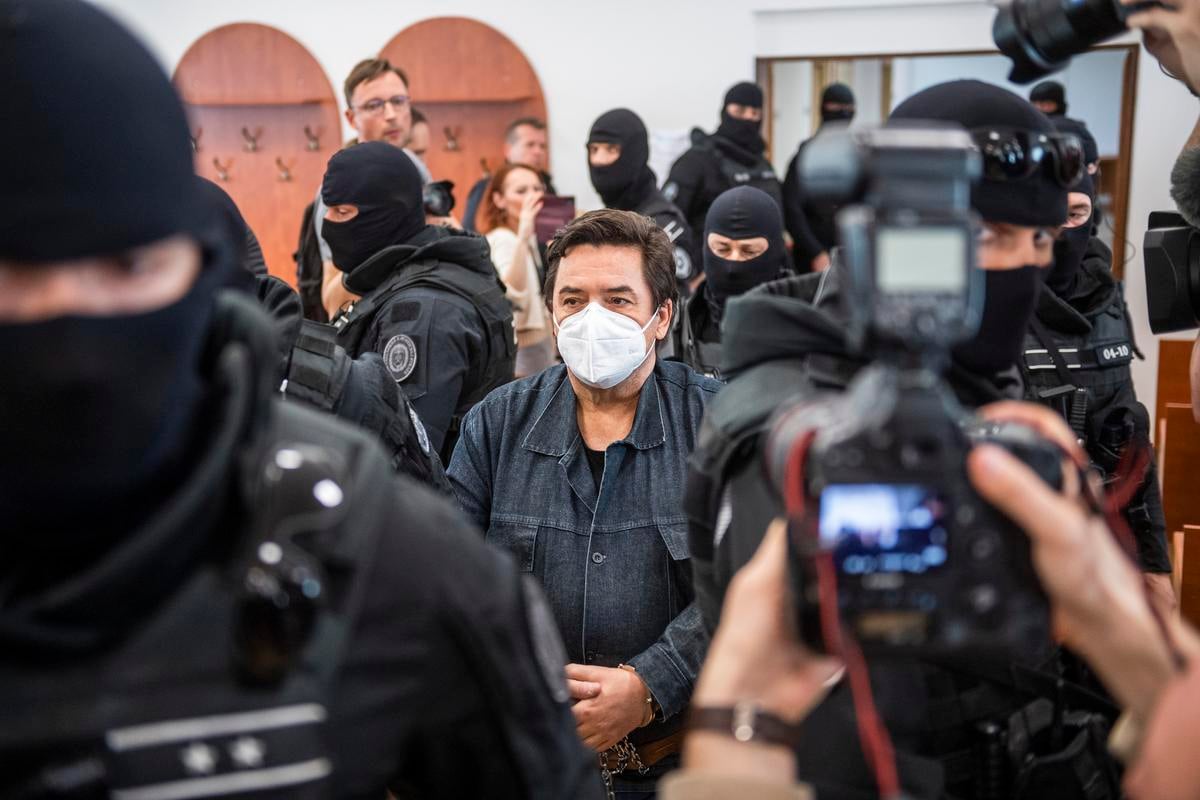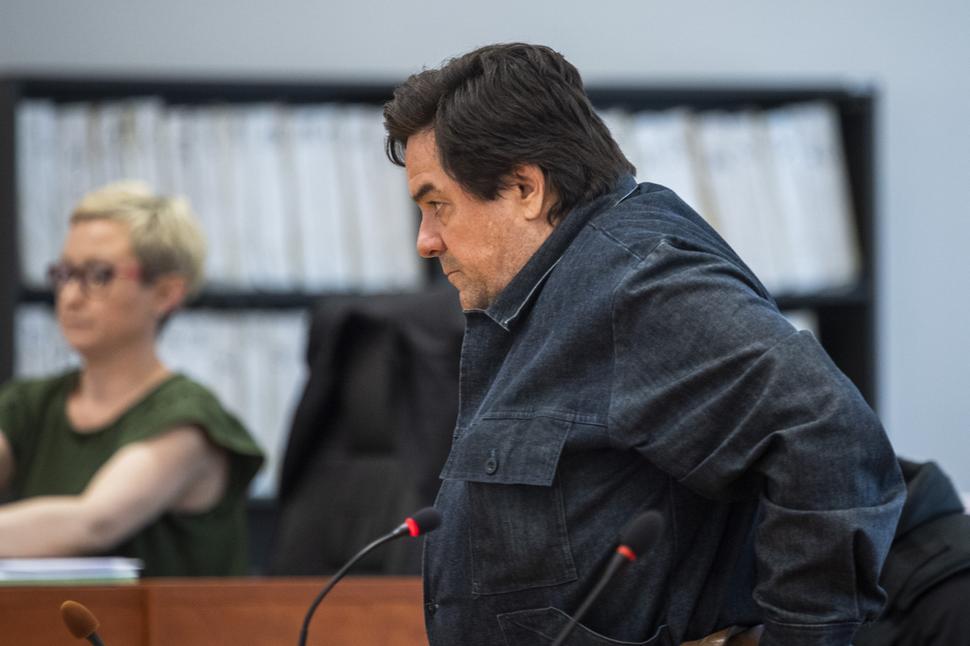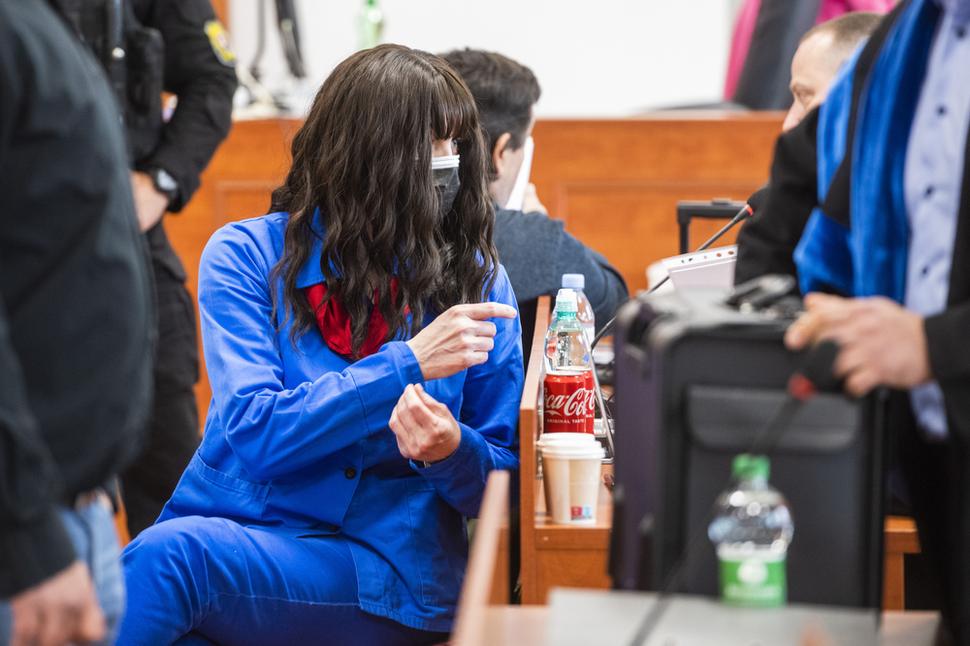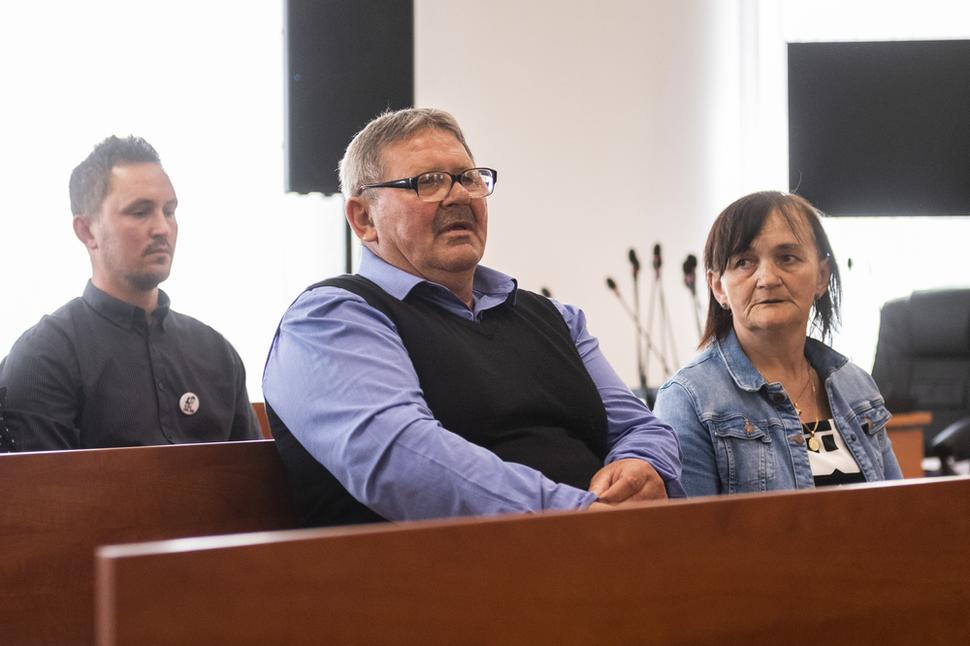The parents of murdered investigative journalist Ján Kuciak and his fiancée Martina Kušnírová were in tears and shocked after Slovakia’s Specialised Criminal Court yet again acquitted the businessman Marian Kočner, yet at the same time found his associate Alena Zsuzsová guilty of masterminding the pair’s murder.
“Phooey on the Slovak judiciary,” Kušnírová’s mother, Zlatica, commented on the latest verdict as soon as she ran out of the courtroom. Kuciak’s father, Ján, uttered that justice is not only blindfolded but also has “headphones on”.
The May 19 ruling follows two previous verdicts in the case of the young couple killed in Veľká Mača, western Slovakia, on February 21, 2018: a 2020 verdict acquitted Kočner and Zsuzsová, though a year later the Supreme Court cancelled what it termed the premature and flawed decision, and ordered the Specialised Criminal Court to retry the case.
The Kuciak case was later merged with another connected case, the attempted murders of prosecutors.
The panel of three judges presided over by Ružena Sabová on May 19 sent Zsuzsová to prison for 25 years in the Kuciak case and in the case of attempted murders of two senior prosecutors in the years 2017-2018. She is also obliged to pay €160,000 to the grieving families. Zsuzsová, who is already serving a 21-year prison sentence for her involvement in an unrelated murder, was not in court to hear the verdict.
While the panel had absolutely no doubts about her guilt, arguing she masterminded the journalist’s murder behind Kočner’s back, the panel could not agree on the businessman’s alleged guilt in the Kuciak case. The vote ended 2-1 in favour of Kočner. According to the panel, the represented evidence was not full proof when it came to Kočner’s involvement in the murder.
“In case of doubt, these doubts must be interpreted in the defendant’s favour. Even a high degree of suspicion is not enough,” Sabová read out the court’s reasoning, which was streamed online.
“An acquittal is not a decision of innocence, but an expression of a lack of evidence, according to which unproven guilt has the same meaning as proven innocence,” added the judge.
Kočner was also found innocent in the case of the planned murders of the prosecutors.
But observers and politicians believe that Kočner is guilty in the Kuciak case and consider the latest ruling surprising or illogical, pointing to new evidence presented in court proceedings over the past year, Kuciak’s extensive journalistic work on Kočner’s dubious business activities, and Kočner’s threats to Kuciak via phone.
A quiet winner for now, Kočner told the panel after hearing the verdict: “I waive my right to appeal.” However, he didn’t walk free, as he is serving a 19-year sentence for an unrelated fraud conviction.
Others, nevertheless, appealed. It will take several months before the Supreme Court decides on those appeals.
Justice delayed is justice denied
Slovak President Zuzana Čaputová, who is a lawyer by profession, said she felt disappointed and surprised after hearing the verdict. “By sentencing Alena Zsuzsová and acquitting Marian Kočner, the court partially confirmed the story that happened, but for now it remains untold,” she said. The president called on people to not lose hope.
The International Press Institute described the verdict as “a devastating reminder that the battle against impunity is an uphill one”, while Reporters Without Borders said the ruling left a “bitter taste”.
The Kuciaks’ lawyer Peter Kubina was more critical, claiming on Facebook that the Specialised Criminal Court made the same mistakes as the first time. However, he blamed the panel’s arbitrariness for the latest verdict this time.
“I know that sometimes it takes a long time and it is difficult and complicated, but in the end justice always wins over arbitrariness, although sometimes it needs extra time,” he added.
The verdict on the appeals will be announced after the September 2023 parliamentary election. Polls favour the Smer party led by ex-premier Robert Fico. He had to step down amid massive street protests following the murder of the investigative journalist in 2018 and has remained disgruntled about his treatment since.
On Thursday, Fico held a press conference under the banner, “Why has this version of the murder not been investigated?” Flanked by Kočner’s lawyer, Fico said there are other and “maybe more important” versions of what happened that the police have not looked into.
“We [Slovak law enforcement] only toyed with one single version. There was an attempt to blame it [the murder] on Marian Kočner, to connect it with Smer, and basically it succeeded,” Fico argued, pointing to the 2020 election result which left Smer unable to form a government.
Smer tries to paint a picture that the investigative journalist was murdered by a group of VAT fraudsters. In this group, ex-interior minister for Smer, Robert Kaliňák, includes one of the convicted men involved in the Kuciak murder, former Slovak president Andrej Kiska, and several cooperating defendants who have testified in major corruption cases against people linked to Smer.
Preserving her lifestyle
Zsuzsová’s motive to have the prosecutors and Kuciak killed was her fear of losing an income provided to her by Kočner, the panel said. The judges described her relationship with the businessman as a “lifeline” due to her emotional and financial dependence on him. The work of Kuciak and the prosecutors, who were investigating Kočner’s suspicious business activities, therefore threatened her source of income.
On the other hand, the court did not elaborate on where Zsuzsová might have obtained the tens of thousands of euros needed to order all the murders if Kočner had not known about her plans. For example, she paid €50,000 for the killing of Kuciak.
Similarly, the court regarded a story about Zsuzsová mentioning Kočner as the person who ordered the murders to her acquaintance Zoltán Andruskó to be insufficient evidence. Andruskó found two men, Tomáš Szabó and Miroslav Marček, to carry out the murders. The three men, of whom Marček was identified as the killer and Szabó the driver in the Kuciak case, are serving long prison sentences. According to the panel, Andruskó, who is seen as a key witness in the Kuciak case, could not corroborate his story.
“The court does not consider it impossible that Zsuzsová presented the version about Kočner being the orderer [of the murder] to Andruskó in order to give the orders a stamp of importance,” Sabová read out.
In addition, the panel argued there was no hint in communications via the Threema instant chatting app between Kočner and Zsuzsová in the months before the murders that would point to Kočner being the mastermind. Despite many codes in the communication suggesting the murders, like “50-soon-skull” (referencing €50,000 for the murder of Kuciak), the court said the meaning of the codes is not defined anywhere, and each person might explain them differently.
What the court did not question were the photos of Kuciak that Zsuzsová obtained from Kočner, and which he had obtained from a surveillance squad organised by Kočner’s acquaintance and ex-intelligence agent Peter Tóth. The squad surveilled Kuciak and was dismissed several days after the murder of the journalist and his fiancée. The court argued that Kočner would have disbanded it sooner had he known about the murders of the couple. In addition, according to the court, the purpose of the aforementioned photos could have been for something other than preparation for the murder of the journalist.
After Kuciak and his fiancée were murdered, the court said, Zsuzsová decided to plan the murder of a second prosecutor to help Kočner get out of police custody. At that time, his detention concerned a fraud case. According to the court, this proves that Zsuzsová was the initiator and the mastermind of the murders, not Kočner.
Zsuzsová tried to have the first prosecutor killed before Kuciak to help Kočner. It did not go as planned and she reprioritized her goals, making Kuciak the first target, without telling Kočner, the court said. Neither of the prosecutors was killed in the end.
The court also explained that it did not give Zsuzsová a life sentence because a psychological assessment concluded that her rehabilitation is possible, though the probability is low.
As for Kočner, the reasoning read out by the presiding judge admitted that the businessman wanted to take revenge on those whom he regarded as enemies, but it said Kočner had previously used press conferences for that. He even meant to launch a website where he wanted to smear his enemies.
The court concluded that the evidence concerning Kočner in the Kuciak case was only circumstantial, and that he had not known about Zsuzsová’s criminal past.
The Specialised Criminal Court is yet to publish its full reasoning of the verdict in the written form.
New evidence not enough
In almost three years since the first ruling, more pieces of evidence have been compiled in the Kuciak case.
These include an expert opinion on the codes used in the Threema texts exchanged between Kočner and Zsuzsová. Analysts from Comenius University Bratislava, for instance, found that the defendants used more codes days before the murders. The Specialised Criminal Court initially read and understood the texts as literal texts, but it has now admitted some codes were used in the texts. :However, [the court] believes that Zsuzsová initiated these [codes],” said the court.
Zsuzsová described experts’ claims that she communicated with Kočner in code via the Threema app as nonsense.
Following criticism from the Supreme Court, the criminal court no longer considers Andruskó to be an unreliable witness. Moreover, a secret letter written by Andruskó allegedly in late 2017 was added to the list of evidence in April. In it, he describes how Zsuzsová requested the murders of the prosecutors and Kuciak. However, prosecutors do not deem it as important evidence.
Back in 2022, Szabó, the driver, confessed to his involvement in the attempted murders of prosecutors and the killing of Kuciak. He claimed he had received orders from Andruskó. This year, Kočner surprisingly confessed to the illegal obtaining of information on Kuciak and several prosecutors from the state-owned Social Insurance Agency in the years 2017 and 2018. However, he claimed that it had been his associate Tóth who collected this information, which Tóth denies. Regardless, the panel of judges did not see any link between murdering the couple and this activity of Kočner’s.
Another piece of new evidence includes a smartwatch, which recorded Zsuzsová’s extremely high pulse the morning after the couple’s murder. The device had never recorded such a heart rate before or since. Zsuzsová has, however, denied she would have used the smartwatch.
This story was produced in partnership with Reporting Democracy, a cross-border journalism platform run by the Balkan Investigative Reporting Network.


 Marian Kočner arrives in court in Pezinok, western Slovakia, on May 19, 2023. (source: TASR - Jaroslav Novák)
Marian Kočner arrives in court in Pezinok, western Slovakia, on May 19, 2023. (source: TASR - Jaroslav Novák)
 Marian Kočner leaves after the verdict in the case of the murder of journalist Ján Kuciak and his fiancee Martina Kušnírová and in the case of the preparation of the murder of prosecutors at the Specialised Criminal Court in Pezinok on May 19, 2023. (source: TASR - Jaroslav Novák)
Marian Kočner leaves after the verdict in the case of the murder of journalist Ján Kuciak and his fiancee Martina Kušnírová and in the case of the preparation of the murder of prosecutors at the Specialised Criminal Court in Pezinok on May 19, 2023. (source: TASR - Jaroslav Novák)
 Alena Zsuzsová sits in the courtroom on May 12, 2023. (source: TASR - Jaroslav Novák)
Alena Zsuzsová sits in the courtroom on May 12, 2023. (source: TASR - Jaroslav Novák)
 Jozef and Jana Kuciak in courtroom on May 19, 2023. (source: TASR - Jaroslav Novák)
Jozef and Jana Kuciak in courtroom on May 19, 2023. (source: TASR - Jaroslav Novák)